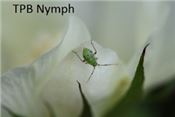Plant Bugs And Cutout – When To Relax

DR. SCOTT STEWART
JACKSON, TENN.
Reports are variable but many are seeing a large increase in the numbers of tarnished plant bugs in cotton, especially nymphs. It is disheartening when populations actually increase 5-7 days after an application was made, but this doesn’t generally indicate a insecticide failure. For example, we rated a test this morning where the best and worst insecticide treatments averaged about 6 to 12 plant bugs on a drop cloth, respectively. This was six days after the application of products like Transform and Orthene (with and without Diamond). On the surface, that appears like a failure until you see that populations in the untreated plots averaged 49 plant bugs per drop cloth. Thus, treatments were providing 75-85 percent control which is very normal level.
TPB-nymph-close-webHow did we get these large populations? We simply didn’t spray the previous 7-10 days. The moral of the story is that your insecticide applications are not in vain … even when you feel like you are not making progress!
It is important to continue battling plant bugs until you’ve accumulated 300-350 DD60s after cutout. Cutout is when you average 5 or fewer nodes above the uppermost white flower, and many fields are approaching cutout at this time. Once cutout is reached, this means you still need to manage your crop for insect pests for 15-20 days. However, I suggest increasing the plant bug threshold from 3 to 5 tarnished plant bugs per drop cloth once cutout is reached. Cotton becomes less sensitive to injury from tarnished plant bugs as it matures. Shown are some data from 2015 showing that terminating insecticide applications for plant bugs too soon after first bloom will cause substantial yield loss. However, in this example, applications for plant bugs after the third week of bloom did not improve yield. The data were pretty consistent throughout the Mid-South that protecting fruit during the first four weeks of bloom was most critical, indicating you can relax … but not quit … after this time. ∆
DR. SCOTT STEWART: IPM Extension Specialist, University of Tennessee